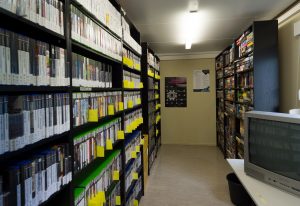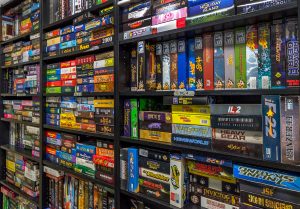Computerspielsammlung
[lang_de]
Längst sind Computerspiele zu einem bedeutenden und einflussreichen Medium unserer Zeit geworden. Dennoch ist es ungeachtet seiner gesellschaftlichen Stellung noch weitestgehend unerforscht, geschweige denn systematisch erfasst oder kategorisiert.
Eine zwingende Voraussetzung für den offensichtlich notwendigen akademischen Zugang ist allerdings die Möglichkeit des direkten Zugriffs auf den Untersuchungsgegenstand.
Der Studiengang Europäische Medienwissenschaft am Institut für Künste und Medien der Universität Potsdam legt mit dem Aufbau einer Computerspiel-Sammlung dieses grundlegende und zentrale Fundament für die wissenschaftliche Auseinandersetzung mit dem Thema “Computerspiel”.
Dank eigener Anschaffungen und insbesondere der umfangreichen Stiftung des Hamburger Journalisten Carsten Görig, sowie der Gesellschaft zur Verfolgung von Urheberrechtsverletzung e.V. (GVU) verwaltet die Europäische Medienwissenschaft heute eine knapp 11000 Titel umfassenden Sammlung sowohl an aktuellen als auch historisch relevanten Computerspielen.
Im Rahmen des DFG-Projekts “Medialität des Computerspiels” hat daraufhin im Wintersemester 2006/07 die Erfassung und Katalogisierung dieser Spiele begonnen.
Hierzu werden von den Studierenden und Lehrenden gemeinsam dem neuen Gegenstand angemessene Kategoriensysteme entworfen, wodurch der Fokus zunächst der medienwissenschaftlichen Prämisse entsprechend auf ästhetischen, kulturellen und technologischen Gesichtspunkten liegt. Demzufolge werden unter anderem Fragen nach Regelstrukturen, narrativen Prozessen, Modifizierbarkeiten, Raumdarstellungen oder Zeitlichkeit aufgeworfen, Lösungsansätze analysiert und geprüft, sowie Methoden der dauerhaften Archivierung entworfen. Ein wesentliches Ziel ist es dabei den Bestand der aktuellen Forschung und Lehre, aber auch zukünftigen Generationen auf möglichst vielfältige und zugleich effiziente Weise zugänglich zu machen.
Das Projekt ist langfristig angelegt und soll kontinuierlich erweitert werden.
Im Rahmen der Arbeit des Zentrums für Computerspielforschung, DIGAREC, soll in Zukunft das Ordnungssystem an die verschiedenen Forschungsperspektiven angepasst werden.
2017 hat der Haushaltsausschuss des Deutschen Bundestages die Realisierung der weltweit größten Sammlung für Computer- und Videospiele beschlossen und dafür Mittel ab 2017 zur Verfügung gestellt. „Die Computerspielesammlung wird mit ihrem weltweit einzigartigen Bestand und der Expertise seiner Initiatoren zu einem international beachteten Leuchtturm für das Kulturgut Computerspiele werden. Der Deutsche Bundestag unterstreicht mit seiner Unterstützung die große Bedeutung der Bewahrung dieses kulturellen Erbes auch mit Blick auf den Wissenschafts- und Wirtschaftsstandort Deutschland.“, so die zuständigen Berichterstatter Johannes Kahrs (SPD) und Rüdiger Kruse (CDU).
Durch die Zusammenlegung der Bestände des Computerspielemuseums, der Unterhaltungssoftware Selbstkontrolle (USK) und der Computerspielesammlungen des Zentrums für Computerspielforschung der Universität Potsdam (DIGAREC) und der Zentral- und Landesbibliothek Berlin soll nun in zwei Stufen die weltweit umfangreichste und bedeutendste Sammlung mit mehr als 50.000 Computer- und Videospielen entstehen. In der ersten Phase soll eine gemeinsame digitale Datenbank geschaffen und öffentlich zur Verfügung gestellt werden. Danach sollen in einer zweiten Phase die Sammlungen an einem Standort auch physisch zusammengeführt und zur öffentlichen Nutzung freigegeben werden. Die Stiftung Digitale Spielekultur organisiert und koordiniert das Projekt.
Die CGC bedankt sich für die fortlaufende Bemusterung bei: Activision, bhv Software, CDV Software Entertainment, dtp Entertainment, Electronic Arts, Microsoft Games, Nintendo, Sony Computer Entertainment, Ubisoft sowie Vivendi Games. Take 2, Capcom, Frogster Interactive Pictures, Rockstar Games
Leitung: Dr. Sebastian Möring
Projektassistenz: Lydia Kray
Die Computerspielesammlung wird zusätzlich begleitet durch wiederkehrende Seminare zur Pflege und Aktualisierung der Sammlung im Kooperationsstudiengang Europäische Medienwissenschaft der Universität Potsdam und der Fachhochschule Potsdam. Hier gewinnen die Studierenden einen Einblick in die Theorie und Praxis der Computerspielforschung. Die Arbeit am und im Archiv bietet eine Möglichkeit sowohl zur medienarchäologischen Auseinandersetzungen mit dem Material, wie auch mit der Analyse aktueller Spiele und Spielkulturen.
Teilnehmer*innen WiSe 2017: Sandra Buttress, Hendrik Fischer, Denise Hall, Lisa Hein, Hans Moritz Hermann, Anja Kohl, Adam Larsen, Lennart Mackies, Maurice Mathieu, Svenja Milautzcki, Philipp Röbke, Rabiya Sezgin, Christoph Ulrich, Elena Varganova und Thomas Zinger.
Teilnehmer*innen SoSe 2011: Marwin Bäßler, Benjamin Gaede, Sarah Girod, Anne Golling, Stefano Graziano, Tobias Gutsche, Stefan Hennicke, Marina Kirpichenok, Christoph Koch, Christin Murawski, Judith Scholl, Anne-Christin Schulze, Antje Ziska.
Teilnehmer*innen WiSe 2010: Jasmin Aßmann, Marwin Bäßler, Lea Katharina Becker, Robert Brauer, Buzariashvili Tamar, Benjamin Gaede, Stefan Hennicke, Judith Jaskowski, Marina Kirpichenok, Domique Moro, Antje Ziska.
Teilnehmer*innen SoSe 2010: Benjamin Gaede, Katja Gajek, Tina Gerova, Tobias Gutsche, Stefan Hennicke, Inger Neick, Christian Richter, Jana Schubert, Marie-Christin Selig, Saskia Singhuber, Thomas Stengel, Markus Trutt.
Teilnehmer*innen WiSe 2009/10: Tina Dreisicke, Benjamin Gaede, Fabian Keck, Maria Kisyova, Patrycja Komm, Dalia Naujokaityte, Megi Parunashvili, Christian Richter, Judith Scholl, Jana Schubert, Jeannine Schulz, Saskia Singhuber, Thomas Stengel, Catharina Thiesen, Markus Trutt, Olha Vasyura.
Teilnehmer*innen SoSe 2009: Sven Adloff, André Bressel, Tina Dreisicke, Matthias Elze, Henriette Moegel, Megi Parunashvili, Jeannine Schulz, Catharina Thiesen.
Teilnehmer*innen WiSe 2008/09: Maike Diechmann, Sebastian Herzig, Stefan Kallert, Bianca Lange, Susanne Langer, Dalia Naujokaityte, Anne Schaal und Sarah Wangler.
Teilnehmer*innen SoSe 2008: Maike Diechmann, Claudia Kanitz, Mischa Karth, Sonja Krvavac, Wolfram Moeller, Kathi Nicolaus, Juliane Otto, Martin Petrick, Kristina Plohmann, Anne Schaal, Daniel Vender und Sarah Wangler.
Teilnehmer*innen WS 2007/08: Kathleen Friedrich, Joël Kaczmarek, Hannes Maurer, Sebastian Möring, Stefan Saffert, Christian Schneider, Michael Schuon, Stefanie Sommerfeld und Daniel Vender.[/lang_de]
[lang_en]
Computer games have long since become a significant and influential medium of our time.
Nevertheless, it is still largely unexplored, let alone systematically recorded or categorized, regardless of its position in contemporary culture.
A mandatory requirement for the necessary academic research, however, is the possibility of direct access to the object of investigation.
The course of studies European Media Studies at the Institute for Arts and Media of the University of Potsdam lays the foundation for a computer game collection that is a fundamental and central foundation for the scientific examination of the computer game.
Thanks to its own purchases and especially the extensive foundation of the Hamburg journalist Carsten Görig, as well as the Society for the prosecution of copyright infringement e.V. (GVU), the European Media Science today manages a nearly 11,000-title collection of both current and historically relevant computer games.
As part of the DFG project “Mediality of the Computer Game”, the collection and cataloging of these games began in the winter semester of 2006/07.
To this end, students and lecturers jointly design appropriate systems of order for the new subject, whereby the focus is on the aesthetic, cultural and technological aspects of the media-scientific premise.
As a result, issues such as rule structures, narrative processes, modifiability, spatial representations or temporality are raised, approaches analyzed and examined, and methods of permanent archiving designed. One of the main goals is to create current research and teaching, but also preservation for future generations to make computer games accessible in the most diverse and efficient way possible.
The project is designed for the long term and is to be expanded continuously.
As part of the work of the Digital Games Research Center, DIGAREC, the archive will be adapted to the various research perspectives in the future.
In 2017, the Budget Committee of the German Federal Parliament decided to implement the world’s largest collection of computer and video games and made funding available from 2017 onwards:
“With its globally unique holdings and the expertise of its initiators, the computer games collection will become an internationally recognized beacon for the cultural asset of computer games. With its support, the German Federal Parliament underlines the great importance of preserving this cultural heritage, also with regard to Germany as a location for science and business.”, said the responsible rapporteurs Johannes Kahrs (SPD) and Rüdiger Kruse (CDU).
By merging the holdings of the computer game museum, the entertainment software self-control (USK), the computer game collection of the Digital Games Research Center of the University of Potsdam (DIGAREC) and the Central and Regional Library Berlin, the world’s largest and most important collection of more than 50,000 computers and video games is created.
In the first phase, a common digital database will be created and made publicly available. According to this, in a second phase, the collections are to be physically combined at one location and released for public use.
The Digital Game Culture Foundation organizes and coordinates the project.
The CGC (Computer Games Collection) expresses its gratitude for the ongoing sampling to:
Activision, bhv Software, CDV Software Entertainment, dtp Entertainment, Electronic Arts, Microsoft Games, Nintendo, Sony Computer Entertainment, Ubisoft and Vivendi Games. Take 2, Capcom, Frogster Interactive Pictures, Rock Star Games.
Head: Dr. Sebastian Möring
Project Assistance: Lydia Kray
The computer games collection is additionally accompanied by recurring seminars on the maintenance and updating of the collection in the cooperation program European Media Studies of the University of Potsdam and the University of Applied Sciences Potsdam. Here, students gain insight into the theory and practice of computer games research. The work at and in the archive offers a possibility for mediaarchaeological discussions with the material, as well as the analysis of current games and gaming cultures.
Participants Winter semester 2017/18: Sandra Buttress, Hendrik Fischer, Denise Hall, Lisa Hein, Hans Moritz Hermann, Anja Kohl, Adam Larsen, Lennart Mackies, Maurice Mathieu, Svenja Milautzcki, Philipp Röbke, Rabiya Sezgin, Christoph Ulrich, Elena Varganova and Thomas Zinger.
Participants summer semester 2011: Marwin Bäßler, Benjamin Gaede, Sarah Girod, Anne Golling, Stefano Graziano, Tobias Gutsche, Stefan Hennicke, Marina Kirpichenok, Christoph Koch, Christin Murawski, Judith Scholl, Anne-Christin Schulze, Antje Ziska.
Participants winter semester 2010/11: Jasmin Aßmann, Marwin Bäßler, Lea Katharina Becker, Robert Brauer, Buzariashvili Tamar, Benjamin Gaede, Stefan Hennicke, Judith Jaskowski, Marina Kirpichenok, Domique Moro, Antje Ziska.
Participants summer semester 2010: Benjamin Gaede, Katja Gajek, Tina Gerova, Tobias Gutsche, Stefan Hennicke, Inger Neick, Christian Richter, Jana Schubert, Marie-Christin Selig, Saskia Singhuber, Thomas Stengel, Markus Trutt.
Participants in winter semester 2009/10: Tina Dreisicke, Benjamin Gaede, Fabian Keck, Maria Kisyova, Patrycja Komm, Dalia Naujokaityte, Megi Parunashvili, Christian Richter, Judith Scholl, Jana Schubert, Jeannine Schulz, Saskia Singhuber, Thomas Stengel, Catharina Thiesen, Markus Trutt, Olha Vasyura.
Participants summer semester 2009: Sven Adloff, André Bressel, Tina Dreisicke, Matthias Elze, Henriette Moegel, Megi Parunashvili, Jeannine Schulz, Catharina Thiesen.
Participants winter semester 2008/09: Maike Diechmann, Sebastian Herzig, Stefan Kallert, Bianca Lange, Susanne Langer, Dalia Naujokaityte, Anne Schaal and Sarah Wangler.
[/lang_en]


